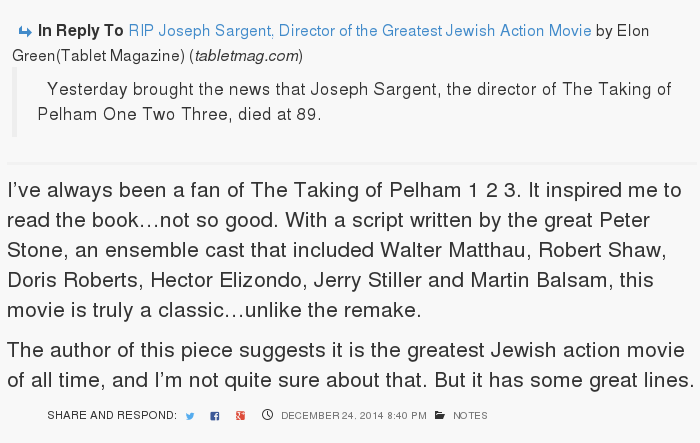Year: 2015
MapUpdated Response Display
 On the 23rd of December, I completed a major update to this site, as part of a commitment to do so by 2015. I often forget to document these changes.
On the 23rd of December, I completed a major update to this site, as part of a commitment to do so by 2015. I often forget to document these changes.
I redesigned and updated the portion of the post that shows what a post is in response to(for those that are in response).
Unlike the previous, this blends in with the background of the post itself, and adds in support for an author and profile picture.
I’ve captured two examples of that in this post for posterity.
More coming, but feedback is appreciated.
Post Types, Post Formats, Post Kinds
- A Post Format is a piece of meta information that can be used by a theme to customize its presentation of a post. Confusingly, the slug for post formats is ‘type’.
- A Custom Post Type is a single item of what is generally called a post, although post is also a specific post type. It is more a custom content type.
- A Taxonomy is a grouping mechanism for some posts.
- A Post Kind is a taxonomy that allows posts to be classified according to the kind of post it is.
So, not so much of an invention as a necessity to distinguish from similar concepts
They have gone through some changes. But, at the moment, they are designed as a drop-in replacement for post formats. There are actually many good reasons why the WordPress developers decided a set of standardized formats would make sense…most notably the ability to change themes without losing your customization. Fewer and fewer people are using post formats, however.
Indieweb Post Kinds are designed the same way. The two can exist simultaneously, but you are better off disabling formats in favor of a single solution.
As more and more sites incorporate concepts like “Like’, ‘Favorite’, and so on, one’s own site should support these. This allows for that.
The plugin supports sending webmentions via the WordPress Webmentions plugin, to send notices to other sites you might be ‘liking’, replying to a post on, etc…assuming the other site supports it. But more and more indieweb sites are doing so.
Some Developments in My Developments
After developing a lot of my tools on Github, I’ve decided to move them where people can use them, the official WordPress repository. I’ve added two of them so far, the ones I’ve deemed ready for other people to try.
- Post Kinds – Allows WordPress posts to respond and interact with other sites, as well as certain passive post types.
- Syndication Links – A basic plugin that adds links to other sites to the bottom of a post. If you check this post, there are icons indicating I sent a link to it to Facebook, Twitter, so on.
So far, if you watch this site, I haven’t been posting much. Need to work on that. I do seem to have users though. Most notably, one in Australia. I say notably because compared to my sporadic posting, my plugin is in regular use by someone, which encourages me to evolve and iterate…and even add some features I didn’t think of.
I now support passive kinds of posts. This would be actions like Listened To, and Watched. I’d better start listening and watching things.
But most importantly, I’ve always felt myself a horrible programmer, since I gave up on it many years ago. Having a project that I enjoy doing for myself, and at least a few other people are using, inspires me to try to be better. I think I’ve graduated to mediocre programmer. If I keep at it, I might get to decent.
The last iteration used Twitter bootstrap. I built this one from the ground up. It’s still a work in progress, but putting it live while I build out more of the features.
While certainly I became familiar with him, like most people, through Star Trek, I remember his work in Never Forget, his poetry, the controversy over his decision to publish his photography, and many other things…I’ve tried to forget the singing.
While, after declaring he was and was not Spock, he’d come to terms with how much his most iconic character resonated with people, and it was never for the obvious reasons. The last thing Nimoy posted on Twitter, 4 days ago, was, “A life is like a garden. Perfect moments can be had, but not preserved, except in memory. LLAP.”
In the end, all I can say is what Dr. McCoy said about Spock when he died(although on film, nothing is ever permanent). “He’s not really dead. As long as we remember him.”
